Paris Restaurants: 11 Dos and Don’ts

Wed 3 Jul 2013
As we all know, the French take their dining seriously. The insider info about what to do when and where, and what to beware of, is helpful whether you are simply stopping for coffee at a neighborhood café or are dining at a classic brasserie, a bistro or one of the many elegant modern Paris restaurants. Once you’ve picked your spot, you’ll need to follow these simple but helpful dos and don’ts. Bon appétit!
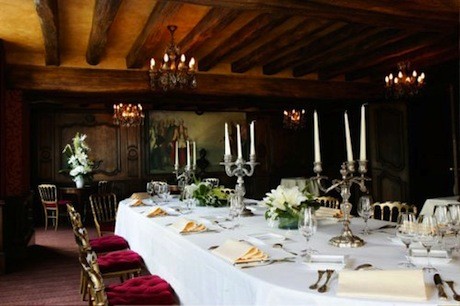
Photo via Eva’s Blog.
1. If you don’t want to breathe smoke, don’t sit on the terrace. This is particularly important in winter, when so many of the cafés and bistros enclose their sidewalk terraces with awnings and plastic coverings to keep in the heat. This is where the smokers head in winter. So sit here if you want to light up or watch others enjoy smoking! In summer it’s not as much of an issue.
2. Do reserve ahead. So many visitors to Paris and the other large cities in France make the mistake of not reserving ahead. They blithely walk around with the assumption that every bistro is divine. Not true! You can get a lot of bad-to-mediocre meals in Paris and elsewhere in France, so do your homework—consult the foodie websites (not just the guidebooks) and reserve as far as one month in advance for the most popular places. Beyond the foodie faves and the restaurant listings by arrondissement on our website, Girls’ Guide to Paris, we also like the sites Le Fooding, which covers all of France, and Paris by Mouth.
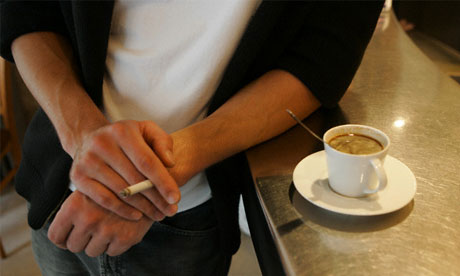
Photo: Owen Franken/Corbis via guardian.co.uk
3. Take planning the food itinerary for your trip seriously; it’s as important as deciding where to shop and which museum exhibitions to take in. Let’s face it: food is one of the main reasons to travel to France. Be sure to find out the best pâtisserie near where you are staying and venture there for breakfast, even if you have to take your delicacies back to the hotel or wherever you are staying. Pastry, beyond everything else in France, is the area in which the French excel the most. There is no intelligent person who would try to make the claim that pastry is better elsewhere. Do try samples from several bakeries and boulangeries around you, really put some effort into it, and then spend the rest of the day walking off the calories. You can diet once you are back home.
4. Know the difference. A café is a casual place to stop in the morning or afternoon for a coffee or tea. You can quickly grab a croissant and a café crème here if you are in a rush. You’ll spend less money if you stand and take your drink at the bar; if you sit down, you’ll be charged more. This is not a place to experience a good French meal. If you are hungry and don’t care too much where you eat, you can have a croque-monsieur, a simple baguette sandwich or a salad at a café. In general, however, these places are not for foodies; they are akin to diners in the United States. A bistro is a homey, family-run restaurant that tends to be more casual and more traditional than a restaurant. A brasserie usually offers traditional Alsatian fare and serves beer, and tends to be open late and between lunch and dinner for off-hour dining. A restaurant typically has the most sophisticated dining, with talented chefs serving serious food. But do your research, because all restos (slang for restaurants) are not created equally. Beyond the cities, in the smaller towns and villages, you might be able to find cafés and bistros that serve what I call a worker’s lunch, often a real steal, including three courses and wine for around 12–15 euros. These are great places to catch a glimpse of life in the provinces and the people who live there, so ask the locals where to find a good one.
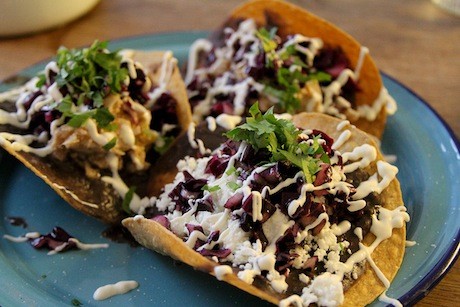
Photo via lostincleeseland.com.
5. Don’t be afraid to step outside the norm and try some ethnic food. Of course ethnic cuisine is much more widely available in the cities than in the country. A good rule of thumb is that if the cuisine is from a former colony of France, you should be able to find a good place to try it. Hence, Vietnamese food and North African food from Algeria or Morocco are the top ethnic cuisines to sample.
6. French food consists of much more than escargot and foie gras, as you well know. Each area of France has its own specialty. If you are in the Basque area, of course try all or many of its specialties, such as axoa (veal stew) and anything made with piment d’Espelette (a type of chili pepper). If you are in Burgundy get the snails, and order oysters and try a galette when you are in Brittany. If you are in Paris, you can find a restaurant (or many) that specializes in each region.
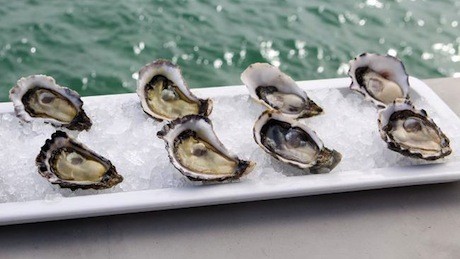
Photo: The Daily Telegraph.
7. Ask for suggestions. I almost never go wrong when I’m at a good place and ask the waiter what he or she recommends. What are the most popular dishes? What does the chef recommend tonight? And above all, what wine is best to drink with what I’ve ordered? This is particularly true when you are eating at a wine bar. Wine bars are all the rage in Paris, and matching wine with food is the proprietor’s passion, so let him or her shine! And ask for l’addition when you’re completely ready. At a good restaurant or a simple café, you can normally sit for hours after you’ve finished—it is considered the height of rudeness to rush you out after you’ve eaten. This is one of the best customs in France.
8. Forget about ordering sushi. It’s terrible in 97 percent of the places that serve it. Even though the French love it, they just don’t yet have it right, so wait until you are home.
9. Do not try to eat out in Paris at 6 or 7 p.m. Parisians eat later. A normal reservation hour is 9 p.m., but 8 p.m. is okay, too. It’s no fun to be in a restaurant that’s empty, and most of them don’t even open until 7 or 7:30 in the evening. Dinner hours are earlier in the country, around 7:30 or 8 p.m. Hours run later in the summer, as it’s tripist season and the light lingers until nearly 10 p.m.
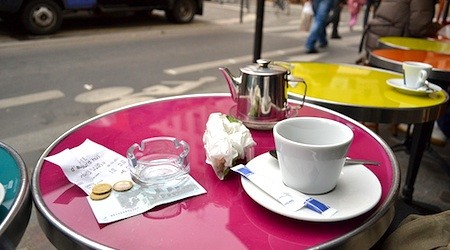
Photo: Milstan via EuroCheapo.
10. Stay off the main intersections; do not go to the BIG café that is all lit up with a big menu that is translated into English. That type of place, 9 out of 10 times, is really just a café for grabbing a coffee, or at worst it’s a tripist trap. Good food is almost always found on the smaller streets in smaller restaurants, with very small menus in windows or chalkboard menus that change daily.
11. The tip is included at every restaurant or café no matter what the waiter might tell you. A service charge of 12–15 percent is the norm and is included in your bill, but if you’ve had particularly good service, you can leave an extra 5 percent, no more, in cash. But there is no requirement that you tip. There is never a place to tip on the credit card receipt; this is simply not done.
Related Links
GG2P resto reviews
Le Fooding
Paris by Mouth, started by two Girls’ Guide alumni
Editor’s note: Do you follow us yet on Tumblr, Pinterest and Instagram? If not, why wait? It’s free, fun and a beautiful reminder of our favorite city—Paris of course!